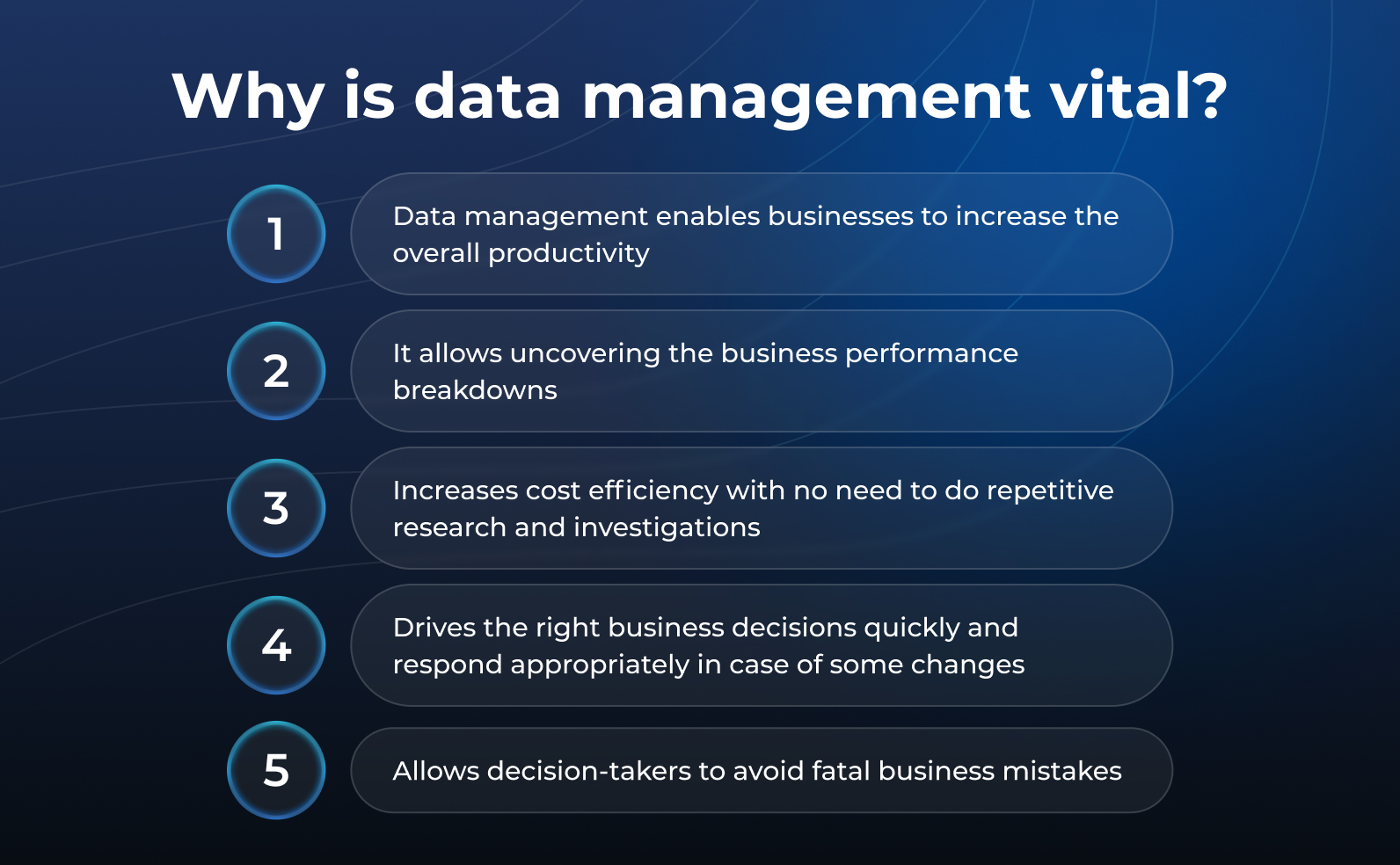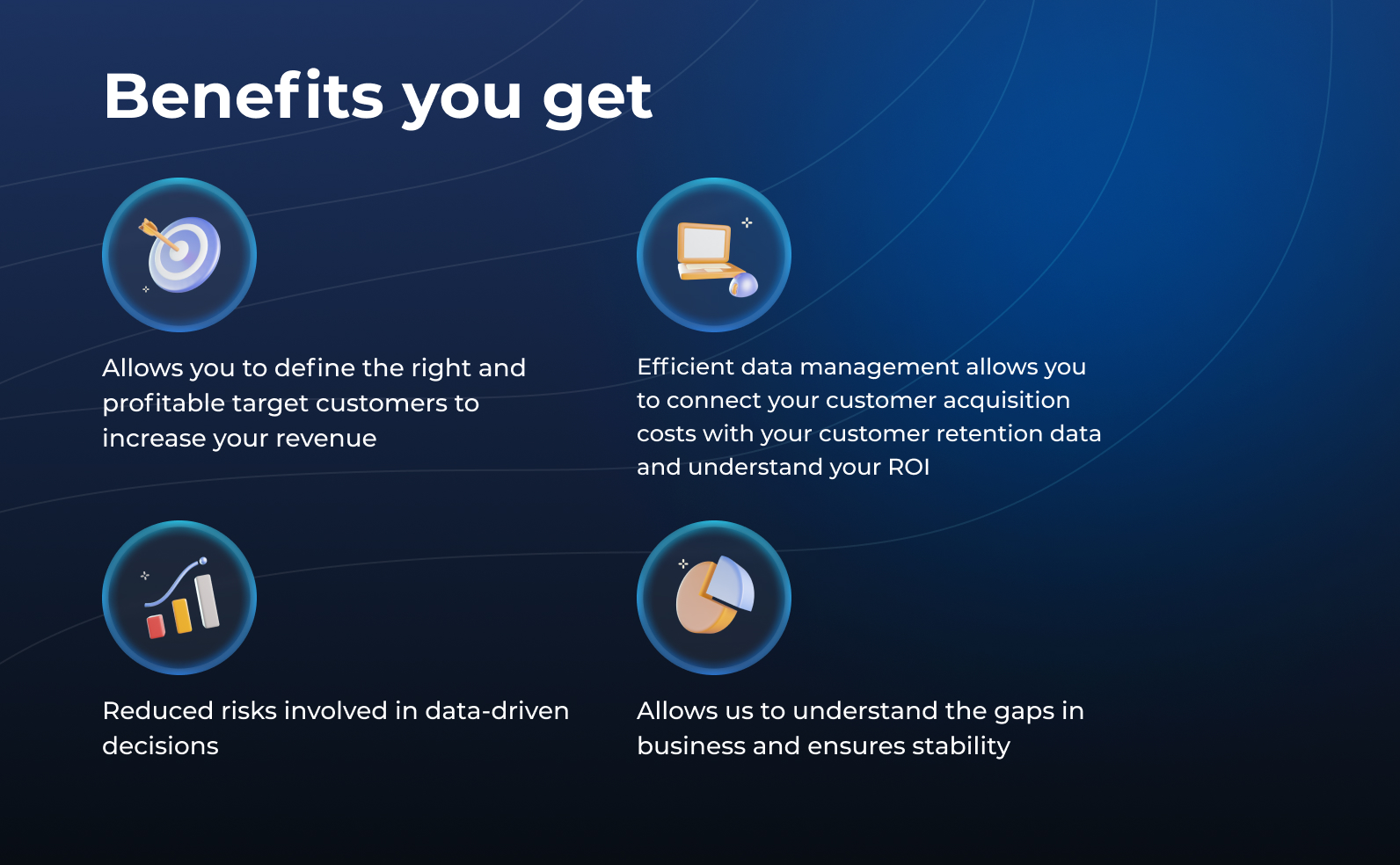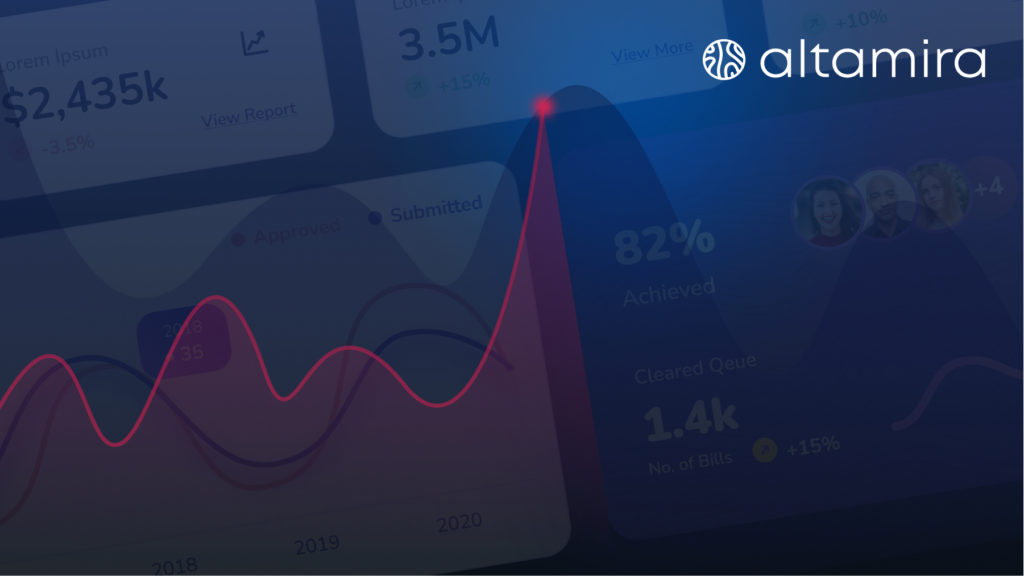Table of Contents
Today businesses generate more data than ever before, and the value of such customer business-generated data has also considerably increased. This customer and business operations-generated data create many challenges for businesses of all sizes, and the middle business is not an exception. Implementation of strategic data management can become a considerable competitive advantage.
However, having no established strategy and process for efficient data management middle businesses lose the critically important potential of their businesses, which helps to increase revenue, productivity, and customer experience.
What is data management and why is it important?
Data management is collecting, structuring, storing, and protecting valuable data associated with leads, deals, and business-generated data. It is considered a precious asset for a business.
To access that value, you have to treat your data properly. Thus you need a data management framework, which allows you to properly collect, process, and classify data. Effective data management and integration of data from various resources and formats make it difficult to effectively leverage data for improved decision-making. The data management process includes a combination of various tools applied to make sure that corporate system data is accurate, secure, structured, and accessible. According to the research, 90% of business leaders consider data processing a vital factor influencing the success of their business.Why is data management vital?
- Data management enables businesses to increase the overall productivity;
- It allows for uncovering the business performance breakdowns;
- Increases cost efficiency with no need to do repetitive research and investigations;
- Drives the right business decisions quickly and respond appropriately in case of some changes;
- Allows decision-takers to avoid fatal business mistakes.

The lack of proper data management tools and strategies leads to incompatible data silos, unstructured massive datasets, and poor data quality. As a result – you are unable to take data-driven business decisions and lose a huge value for business together with the portions of lost data.
Types of data management
Data management systems are built on special platforms and include a range of components and processes helping you to extract the maximum value out of the data generated. These components include database management systems, data warehouse, data lakes, integration tools, analytical tools, and many more.
Exist various phases of the data management processes including data integration, data modeling, storage, processing, data governance, data lifecycle management, data pipelines, data security, and data architecture.
DLM - Data lifecycle management system
Data lifecycle management identifies different stages which data flows through and creates policies to manage each of the data stages. It allows for maximizing the useful life of data.
The main stages are:
- Data collection;
- Accessing information;
- Usage;
- Storage;
- Transferring;
- Deletion or destruction.
Each data portion takes the path from one system to another and it is called a data pipeline. In some cases, following these paths changes the data.
Master data management (MDM)
Master data management means that a reliable source of information can be sourced from multiple sources, which may include product data, customer data, asset data, financial data, etc. MDM focuses on reducing business process and operation errors in various areas of the business. An MDM is defined as data management based on data governance and data quality.
Data Architecture
Data architecture helps your business to understand and interpret data. It is a structure that allows supporting chosen data strategy. Data architecture covers data storage, data usage, and security.
Data modeling
Data modeling comprises schemes of your systems and the data which your systems contain. It allows tracking the movement of data through systems and business processes.
Data catalog
These catalogs make data more transparent and accessible for users. It allows employees from different departments to easily access the type of data they need.
Data integration
Data integration allows for meeting the data consumption requirements of all applications and business processes. Exists many popular data integration ways, one of which is ETLs allowing to pull of data from multiple sources into a single source. During this process the data follow the next steps:
- Extraction – pulling data from the database;
- Transformation -formatting and preparing data for analysis;
- Loading – rooting data to the desired location/storage.
Data governance
Data governance regards the establishment of the right infrastructure which allows individuals across the company to have authority and responsibility for handling specific kinds of data. It is a part of the compliance system and takes care of the mechanics, storage, and security of the data that enters the system. It also ensures that data is accurate and ready to be handled.
What are the benefits for your business when setting up an efficient data management strategy?
Most companies have a passive approach to their data management. However, with a scrupulous proactive approach and the right data management strategy which identifies the kinds of data your company will use, assigns the responsibilities properly, and establishes the procedures for efficient data management it is possible to extract the maximum value from your data.

Benefits:
- Reduced risks involved in data-driven decisions;
- Allows you to define the right and profitable target customers to increase your revenue;
- Efficient data management allows you to connect your customer acquisition costs with your customer retention data and understand your ROI;
- Allows us to understand the gaps in business and ensures stability.
Steps allowing to establish an effective data management
1. The development of data architecture. It provides a blueprint for databases and data platforms that could be deployed.
2. Data processing. Mainly using machine learning technologies data is collected and translated into useful information.
3. Assign responsibilities. Ensure clarity and exact team roles. Define who will be responsible for capturing separate kinds of data.
4. Define standards for naming and structuring files. It will ensure clarity and consistency, in case you will need to instantly access a definite kind of data.
5. Clarify the data collection process and collect data using various methods. These data collection methods include surveys, customer or employee interviews, user behavior insights, user testing, etc.
6. Data preparation. It is also one of the most important steps. You need to convert the constructed data set into a format that the software will be able to understand and process.
7. Data analysis. It often happens with the help of machine learning algorithms allowing to speed up the data processing and make it quicker and more precise, saving time and effort.
8. Data interpretation. It presupposes the documentation of all previous steps and summarizing of the gathered results in a form of a report.
9. Share the results. Share the results with various departments and communicate your processes with them to make sure you collect the same type of data for further research. It will eliminate the inefficiencies and confusion in process of data management between various departments.
A unified data management strategy allows for the coordination of all the organizations’ activities and supports the common business aim. It also eliminates silos of information, allows each employee to see one’s contribution and keeps all goals and activities aligned with the common aim.
What are the data management challenges and how to address them?
After you have decided to improve your data management process and make your approach to it more responsible, you should be ready to face the possible data management challenges.
Safety issues
With the lack of data management, the safety of your data is at risk. An adequate data strategy enables businesses to maintain smooth workflow, improve operational systems, and drive more data-based decisions.
Without it, companies face a number of risks affecting workflow and overall productivity. They include:
- Broken, duplicate, and incompatible data;
- Different formats and infrastructures inside the data system;
- Massive data silos;
- Time-consuming data activities;
- Slow and inefficient data allocation.
Data security is one of the biggest concerns in today’s digital world. Data governance allows for ensuring that security systems are properly set up and administered to protect data.
Using the latest safeguarding technologies, Altamira experts assist in creating of efficient risk-management strategy preventing all attempts to illegally access your sensitive data.
Management of huge volumes of raw data
Dealing with large volumes of data, businesses face the difficulties such as data categorization, raw data processing, and data accuracy.
Altamira data management team with its skilled experts will utilize the right tools and assist in controlling and managing huge volumes of data.
Multiple data storages
The bigger company is, the more data repositories it may have. Those may include databases, CRM, ERP systems, etc. Handling these data-siloed systems is for sure challenging.
Our experts can help you to focus on the most relevant data, remove data silos and organize your data volumes properly for further efficient processing.
Maintaining data quality
Not all data is created equal and you have to filter out unnecessary data. Data in your systems may be outdated, incorrect, or malfunctioning, and processing such data will give the wrong business insights.
Our team will help to establish the right data monitoring standards and guarantee that insights are extracted from relevant and high-quality data.
Data inconsistency
When data is first acquired, it is typically dispersed and unstructured. It comes from various sources and demands a complex management approach.
Our team will deliver senior data management allowing you to take more informed strategic business decisions. Using the right Business Intelligence tools, and processing only high-quality data will allow us to effortlessly integrate data and produce data-driven insights.
Data warehouse
Huge amounts of data are generated daily and it needs their own space for storing.
Our team provides the physical or cloud-based infrastructure required for the appropriate sorting and storage of data.
How can Altamira help with data management?
Altamira data management professionals will help you to manage corporate data through the whole lifecycle and implement the best strategy for your business offering comprehensive data management solutions. We assist with the development and implementation of efficient solutions helping to overcome all data-related challenges and data migration. As a result, you increase the efficiency of your data, and leverage and monetize it.
- Implementation of the best framework for efficient data management;
- Enabling the appropriate software and infrastructure for Data migration;
- Automation of your current processes with AI/ML technologies;
- Data visualisation solutions.
Summing up
Companies that use the value of their big data generated have a considerable competitive advantage. It is the lifeblood of digital transformation. It is used to precinct upcoming events, pivot rapidly, and build solid business resiliency.
Data management practices are applied to improve business processes and identify internal problems and solve them efficiently. Data management gives companies ways to track their data and examine the business process in detail, helping to provide both perspective and plan. Once a database is managed it can become information: business intelligence.
Effective data management has long been critical to business success – from helping organizations improve accuracy and predict trends, to fueling digital innovation, transforming businesses, and enabling new technologies. Data is becoming an important form of capital and organizations are looking for new ways of using their data to benefit themselves.
FAQ
You need to set up data management strategy which will:
-identify specific types of data your company will use;
-assign responsibility for each type of data;
-establishes procedures to govern the gathering, processing, structuring and handling of data;
-allows ensuring high data quality, data availability and disaster recovery;
An efficient data management software allows coordinating of all business activities and decisions allowing to deliver get the highest quality of services and products, allowing each employee to understand the global picture.
Set up a suitable data storage
You need to take care of the proper data storage. You should have the right infrastructure and corresponding security protocols to store sensitive data. No matter which solution you will choose, you need to keep a record of each location of every file. You can connect to the cloud and make sure that valuable files will be backed up to the cloud.
Data requirements
With the growth of your business, the amount of data will also increase. Thus you need to clarify the data requirements. It will help to filter out irrelevant data and prevent storing useless data.
Data safety
As is often the case, during scaling and business growth security issues are often overlooked. As a result, thieves may see data storage as their profitable target. They can steal your data and use it to gain profits, and sell private data to the black market. Thus you need to take care of the reliable and efficient security measures taken.
Data utilization
Data analytics help to optimize data management thus increasing the profitability and efficiency of your business.



